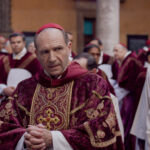I don’t like wearing face masks. They fog up my sunglasses and make my beard itch. It’s hard to talk intelligibly through them and nearly impossible to pick up nonverbal facial expressions that add vital texture to conversation. I have a growing collection of masks, but none of them fits great, I don’t know where to store them, and even the most stylish ones are still pretty awkward. Masks also make it impossible to forget the depressing reality that COVID-19 is still around; they’re an ever-present reminder that the world we knew in February is long gone.
I also hate that the mask has become such a divisive political symbol, with the masked and the masked-nots assuming the worst about each other: that mask-wearers are fearful, cosmopolitan elites or that mask-avoiders are science-hating MAGA bumpkins who prefer their freedom over Grandma’s life. It’s silly that it’s come to this: politicizing masks. But I’m not surprised. Everything in our world today is politicized: ice cream, razors, Harry Potter. So of course protective face masks would be politicized, especially when the president himself makes masks political.
I understand, however, why we so quickly politicize things like masks. Faced with an avalanche of information (too much to ever sufficiently wade through), conflicting voices of “expertise,” and no shortage of inconsistency and hypocrisy from government leaders, we default to siding with whatever partisan camp we’re already in. I suspect rising tribalism across the world has a lot to do with the mental exhaustion of living in a time of information gluttony, where it’s easier to just fall in line with one group or another. For most of us, independent, nuanced appraisal of a litany of complex issues is unrealistic for our already taxed brains.
For Christians, though, it’s important to rise above the political partisanship and think through what our faith would call us to with regard to wearing or not wearing masks. What if our view on masks were shaped more by our Christian identity than our American political identity? As much as I dislike wearing masks, sympathize with some skepticism about them, and cringe at attempts to shame people into wearing them, my Christian faith leads me to wear one when I’m in indoor public places. When I look at Scripture I don’t see a mandate about masks, of course, but I see an invitation—to do at least four things.
1. To Love Your Neighbor (Matt. 22:39)
I’m frustrated that the science on masks during COVID-19 has been inconsistent. It’s maddening that everyone from the U.S. surgeon general to the CDC and the WHO have flip-flopped on their mask guidance. But it’s not surprising. This is a brand-new virus and a fast-moving crisis. We probably won’t know for years what was right and wrong in our efforts to stop COVID-19. But consensus is emerging that wearing masks does slow the virus’s spread and, thus, can save lives.
What if our view on masks were shaped more by our Christian identity than our American political identity?
For Christians called to love our neighbors as ourselves, wearing a mask in public—particularly indoor spaces where social distance cannot be guaranteed—seems like a relatively easy way to practice neighbor love. Even if it’s annoying to wear one, and even if you aren’t convinced by the science behind it, why not wear one anyway? Given the enduring uncertainty about the way COVID-19 spreads, shouldn’t we err on the side of more protective measures rather than less, for the sake of the neighbor we might—even if it’s a slim chance—unknowingly infect?
2. To Respect Authorities (Rom. 13:1–7)
It’s easy to blame leaders these days, and certainly many are making lots of mistakes. But let’s show them grace. COVID-19 is just one of several complex and fast-evolving issues authorities everywhere are facing. Instead of rushing to criticize leaders, what if we gave them the benefit of the doubt—honoring and respecting their authority and believing they are working hard and trying their best? Further, it seems clear from Romans 13 (among other passages, such as Titus 3:1 or 1 Peter 2:13–14) that Christians ought to respect the human governments to which they are subject, as long as submission to those governments doesn’t contradict our submission to the lordship of Christ and his ultimate authority.
When it comes to mask-wearing for Christians, then, if your city or state is mandating masks in certain circumstances right now (as mine is), shouldn’t you obey those directives? Likewise if your church has instituted a “mandatory masks” policy for physical gatherings: go ahead and wear that mask happily—embracing the opportunity to practice Hebrews 13:17.
3. To Honor the Weak in Our Midst (Rom. 14)
Mask-wearing has sadly become divisive in churches where masks are not mandatory. Some churchgoers will wear them; some won’t. Predictably, the groups will start assuming the worst about each other—that mask-avoiders are reckless and see themselves as stronger and braver; and that mask-wearers are cowardly and fear-stricken, needing a nudge in the direction of risk.
In Romans 14 and 1 Corinthians 8 and 10, Paul argues that in matters of freedom, it’s important that “stronger” Christians don’t flaunt their freedom in ways that become stumbling blocks to the weak. When a mask-wearing “weaker” brother enters a church gathering full of mask-free “stronger” brothers, the mask-wearer naturally feels pressure to remove it—but that’s exactly the sort of wounding of the weak conscience Paul says is a “sin against Christ” (1 Cor. 8:12).
4. To Use Freedom for the Sake of the Gospel (1 Cor. 9:19–23)
American Christians are sometimes prone to understanding “freedom” in a way more shaped by the U.S. Constitution rather than by the Bible. But it’s no knock on the beauty and legitimacy of manmade freedoms to suggest that Scripture sometimes calls us to give up these freedoms for the sake of the gospel.
Paul, for example, seems happy to give up his freedom for the sake of loving others (1 Cor. 8:13). “For though I am free from all, I have made myself a servant to all, that I might win more of them,” he writes (1 Cor. 9:19). “To the weak I became weak, that I might win the weak. I have become all things to all people, that by all means I might save some. I do it all for the sake of the gospel, that I may share with them in its blessings” (1 Cor. 9:22–23). There is such missional power in this posture. Few things are more beautiful to witness than someone giving up their rights and freedom for the sake of another.
Few things are more beautiful to witness than someone giving up their rights and freedom for the sake of another.
There’s a lot at stake for Christian witness during COVID-19. Do we want the non-believing world to look at Christians as reckless virus super-spreaders who put their own freedoms (to gather in person as soon as possible, to not wear masks unless absolutely mandated) ahead of the health of their larger community? Or do we want them to look at Christians as “servants to all,” willing to forego their freedoms out of Christlike neighbor love?
If the small annoyance of wearing masks can help not only save lives but also souls, winning more to the gospel, isn’t it worth it?
Try Before You Buy: FREE Sample of TGC’s New Advent Devotional
 Choosing the right Advent daily devotional can be tough when there are so many options. We want to make it easier for you by giving you a FREE sample of TGC’s brand-new Advent devotional today.
Choosing the right Advent daily devotional can be tough when there are so many options. We want to make it easier for you by giving you a FREE sample of TGC’s brand-new Advent devotional today.
Unto Us is designed to help you ponder the many meanings of this season. Written by TGC staff, it offers daily Scripture readings, reflections, and questions to ponder. We’ll send you a free sample of the first five days so you can try it out before purchasing it for yourself or your church.

































